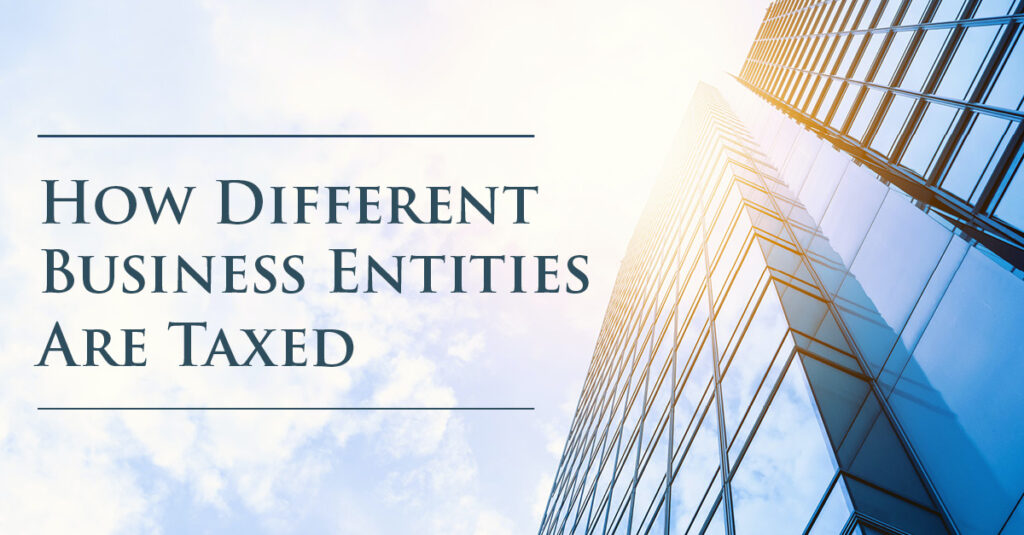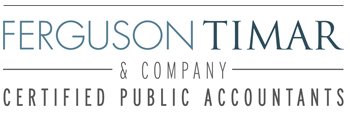
When aspiring business owners are ready to turn their entrepreneurial visions into reality, one of the first tasks they must complete is to choose a legal business structure. An individual who plans to work alone may find the default structure of a sole proprietorship adequate for their needs, but many owners prefer the liability protections that come with organizing in a more formal way as an LLC, partnership, or corporation.
In this article, the experienced CPAs at Ferguson Timar focus on the tax consequences of the most common legal entity types. As a company’s taxation model – and associated benefits and burdens – can impact both the enterprise and its owners in a number of ways, being thoughtful about the taxation-related consequences of choosing a particular business formation type is going to be important if you are thinking about starting a new company.
Sole Proprietorships
Of the five primary business structure types available to aspiring business owners, sole proprietorships are the most straightforward. A sole proprietorship is owned by a single individual. For taxation purposes, there is no distinction between the business and its owner. As a result, all of the income generated and losses incurred by the business are reported on the owner’s individual tax return.
Generally speaking, an owner of a sole proprietorship will report their business income, losses, and tax liability using a Schedule C attached to their personal 1040. As taxes are not automatically withheld from a sole proprietor’s income, they must account for both self-employment taxes and estimated business income taxes when filing.
Partnerships
Partnerships are owned by more than one individual or legal entity. They generally function as a more complex version of a sole proprietorship structure for the purposes of taxation. Essentially, each owner’s share of the partnership’s profits and liabilities will be reported on their personal tax return. This arrangement is often referred to as a “pass-through” structure, as tax liability does not fall upon the business itself but, instead, passes through to each partner in turn.
Partnership owners report their business-related tax benefits and burdens using Form 1065, attached to their personal 1040. Like the owners of sole proprietorships, owners of a partnership must account for both self-employment taxes and estimated business income taxes when filing.
Limited Liability Companies
Limited liability companies (LLCs) may be owned by a single individual or by multiple stakeholders. This business structure offers the most flexibility concerning taxation. If LLC owners – referred to as its members – do not exercise an alternative approach, the Internal Revenue Service will tax single-member LLCs as sole proprietorships and multi-member LLCs as partnerships by default. However, in many states, LLC members can opt to have their enterprises taxed as corporations instead.
S-Corporations and C-Corporations
S-corporations and C-corporations are owned by shareholders. Unlike other entity types, the owner of a corporation is not directly involved in the management of the business. Instead, the shareholders elect a board of directors, which in turn appoints the company’s executive officers. In practice, the same person can be a shareholder, director, and officer of a corporation, making the corporation an option even for someone who owns and operates a business alone.
The primary tax difference between a C- and S-corporation is that C-corporations are taxed as distinct entities and S-corporations are not. This means that C-corporations are taxed as uniquely liable entities, placing no taxation-related reporting burdens – other than income from distributions – on shareholders directly. The primary downside of this arrangement is a risk of double taxation in that taxes may be paid both at the corporate level and when distributions are made. By contrast, shareholders of S-corporations are responsible for pass-through profit and loss taxation on their personal returns.
Ferguson Timar Can Help Your Company to Manage Its Tax Liability Proactively
The taxation of business entities is quite complex. This article only covers the most basic elements. Factors such as the relationship of the owners and the business’s planned activities must be taken into consideration before choosing an entity type.
If you are getting ready to launch a new company or you have concerns about your existing company’s tax liability, know that the knowledgeable CPAs at Ferguson Timar can help you to manage business taxes efficiently and effectively.
Contact our team today by calling (714) 204-0100 to embrace a proactive approach to business-related taxation concerns. Allow our team to take much of the stress off of your shoulders in this regard so that you can focus on growing your company. We look forward to working with you.
